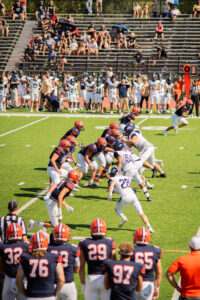By Owen Kutlu, Staff Writer
Many die-hard fans love to see the final game results, stuffed box scores and celebrations. But who really makes it possible for these teams to put together a winning product on the field or court? A major aspect of it comes from the work done by the athletic training staff.
At Gettysburg College, home to 22 varsity athletic teams, the role of the training staff can not go unmentioned. Assistant Athletic Trainer Amanda Singer explained that athletic trainers are “responsible for the prevention of injuries, care of injuries and the rehab process.”
Athletic trainers at Gettysburg have to cover all home practices and games. Singer described her position as “essentially [being] the first responders when an athlete goes down on the field or court.” While it is never good to see an athlete get hurt while playing, the training staff is always ready to step in and provide the best care possible.
With hundreds of collegiate athletes on campus, the training staff is always busy. Per Singer, some of the daily tasks range from “managing doctors appointments to managing return to play progressions, practice modifications and the treatment plan along the way for athletes.” The staff makes every student-athlete a priority and makes sure to be extremely welcoming for anything someone may need.
A main reason why Singer chose to get into this profession is the potential to help so many people. She stated that she chose to become a trainer because she “enjoys working in athletics and also enjoys the medicine side of things, so it combined two of [her] interests into one.” Singer was very appreciative of how her position allows her to “get to work with great people and great athletes.”
Singer earned her bachelor of science in kinesiology from University of Maryland-College Park in 2019 and is a member of the National Athletic Trainer’s Association. This is Singer’s first year as an athletic trainer at Gettysburg, but it is her third year in the occupation.
When asked what she was most proud of about her job, Singer explained that she is most proud of “seeing [athletes] make a big stride in their rehab or return to play.” She went on to say that “there have been a few instances with athletes where that has happened and that is a really good feeling for you, them and everyone.”
Singer mentioned that even seeing someone make an accomplishment off the field is a great feeling, which highlights the relationship that Gettysburg’s training staff builds with all of their student-athletes.
“It is really good to see all the hard work that they put in pay off,” Singer said.
Another important task the athletic training staff takes care of is determining when an athlete is ready to compete again. Singer remarked that it varies based on the injury. However, common factors include “the athletes confidence level, how they are feeling about getting back into play mentally and then [athletic training] may run them through a series of functional tests to make sure they are safe and ready to go back out on the field.” The training staff make sure that they are constantly on the same line of communication with the injured athletes and work with them until they are comfortable to return to play.
Not only is Gettysburg College’s athletic training staff a crucial part in the lives of many student-athletes, but they are yet another great, supportive resource on campus that fosters the tight-knit college community as a whole.
This article originally appeared on page 9 of the October 2023 edition of The Gettysburgian’s magazine.


October 14, 2023
Very informative, comprensive and positive on the role of athletic trainers.
October 16, 2023
I note with disdain that the Bullets football program has become unwatchable.
Why is the team so horrible? Why is the head coach still employed?
Mike Chagares
President, Class of ’84